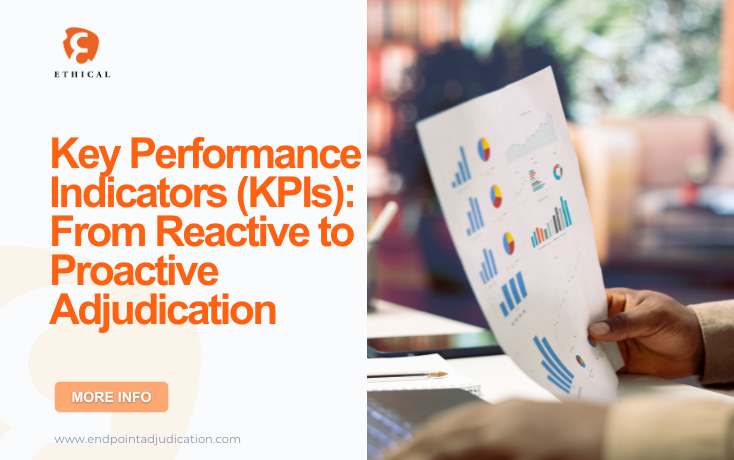Struggling to keep your adjudication process on track? Without actionable indicators, even the most experienced can teams face delays and uncertainty. Discover which Key Performance Indicators make the difference - and learn how to shift from reactive to proactive adjudication with confidence.
Imagine driving a car without a dashboard or GPS. You might still reach your destination, but with limited visibility, the journey could be longer, less efficient, and more prone to error. The same principle applies to clinical endpoint adjudication. Without the right performance tracking tools, managing the process becomes a guessing game. That’s where Key Performance Indicators (KPIs) come into play.
KPIs provide crucial insights into how well your adjudication process is functioning. By continuously monitoring study statistics, time-related performance indicators, and quality control measures, clinical development leaders can navigate toward efficient, transparent, and timely adjudication outcomes.
What Are the actionable KPIs in Endpoint Adjudication?
KPIs encompass three critical categories:
- Study statistics: Quantitative data on events and case progress
- Time-related Key Performance Indicators (KPIs): Timelines for each step in the adjudication workflow
- Quality control (QC): Measures ensuring process integrity and consistency
Together, these indicators enable the adjudication team to proactively identify bottlenecks, assess reviewer performance, and implement corrective actions as needed.
Frequently Used Key Performance Indicators
Study Statistics
Tracking event volumes and statuses offers a high-level overview of your study's progress. Commonly monitored indicators include:
- Recorded vs. expected events: Helps assess overall study completion.
- Pending cases between dates: Useful for evaluating site or reviewer workload and identifying delays.
- New vs. closed events over time: Provides visibility into process momentum and potential lags.
- Events by type: Crucial for studies with multiple endpoint categories.
- Events by status (e.g., “pending review”, “more data requested”): Pinpoints where cases are held up.
- Pending events per reviewer: Highlights load imbalance or reviewer-specific issues.
- Closed events by disagreement type (Agreed/Major/Minor): Measures committee efficiency in resolving disagreements.
- Closed events by type: Aids in tracking study completion by event category.
- Disagreements over time and by reviewer: Reveals emerging patterns that may warrant discussion or training.
Time-Related Key Performance Indicators (KPIs)
Time-based KPIs help identify inefficiencies at every adjudication step. Key KPIs include:
- Event lifecycle durations: From creation to submission, review, and closure.
- Query timelines: Including resolution and escalation durations.
- Translation milestones: Time required to translate and review translated documents.
- Site responsiveness: Time to upload medical records or respond to queries.
- Event package turnaround: Time from package finalization to review readiness.
- File acceptance rates and query volumes per site/country: Indicates systemic site issues or documentation quality.
Monitoring these KPIs enables swift identification of delays—whether caused by sites, coordinators, reviewers, or support services—and allows targeted interventions.
Quality Control (QC) Indicators
QC indicators ensure that the adjudication process remains robust and credible. Typical quality indicators include:
- QC events vs. total events: Tracks how thoroughly quality oversight is applied.
- Discrepancies in closed events: Differentiates between cases closed with and without disagreements.
- Discrepancies by event type: Useful for targeted training or protocol refinement.
- Major deviations per QC round: Flags trends that may compromise study integrity.
As in the previous car example, the dashboard indications are most useful when compared to set thresholds such as the speedometer indication checked against the speed limit for example. Similarly, when discrepancies or deviations exceed predefined thresholds, corrective and preventive actions must be taken to uphold the adjudication’s scientific rigor.
Why Monitoring KPIs Matters
Systematic monitoring of KPIs from the outset of a study enables clinical teams to address issues before they escalate. Whether the root cause lies in adjudication charter ambiguities, user misunderstandings of the software, or bottlenecks at specific workflow steps, these indicators illuminate the path forward. Often, targeted re-training — of site coordinators, reviewers, or other stakeholders — combined with adjustments to platform settings or protocols can quickly restore performance and ensure adjudication quality.
Looking Ahead: How AI Can Enhance KPI-Driven Adjudication
As digital adjudication platforms evolve, AI is beginning to play a valuable supporting role in optimizing KPIs. For clinical teams, this means gaining earlier visibility into risks — such as workflow delays or site-level inconsistencies — thanks to predictive analytics. AI tools can surface patterns in reviewer turnaround times, flag bottlenecks automatically, or assist in triaging queries and discrepancies more efficiently. While human oversight remains essential, these smart technologies enhance the speed and reliability of the adjudication process by making better use of the indicators already being collected.
Ready to Optimize Your Adjudication Process?
Ethical GmbH’s eAdjudication® platform is built to empower clinical teams with the indicators they need to lead efficiently. From real-time dashboards to custom KPI tracking, we help you drive adjudication with confidence.
Get in touch with us today.
Discover how eAdjudication® can transform your clinical endpoint adjudication process. Reach out to our experts at Ethical GmbH to learn more by filling out the form below.




